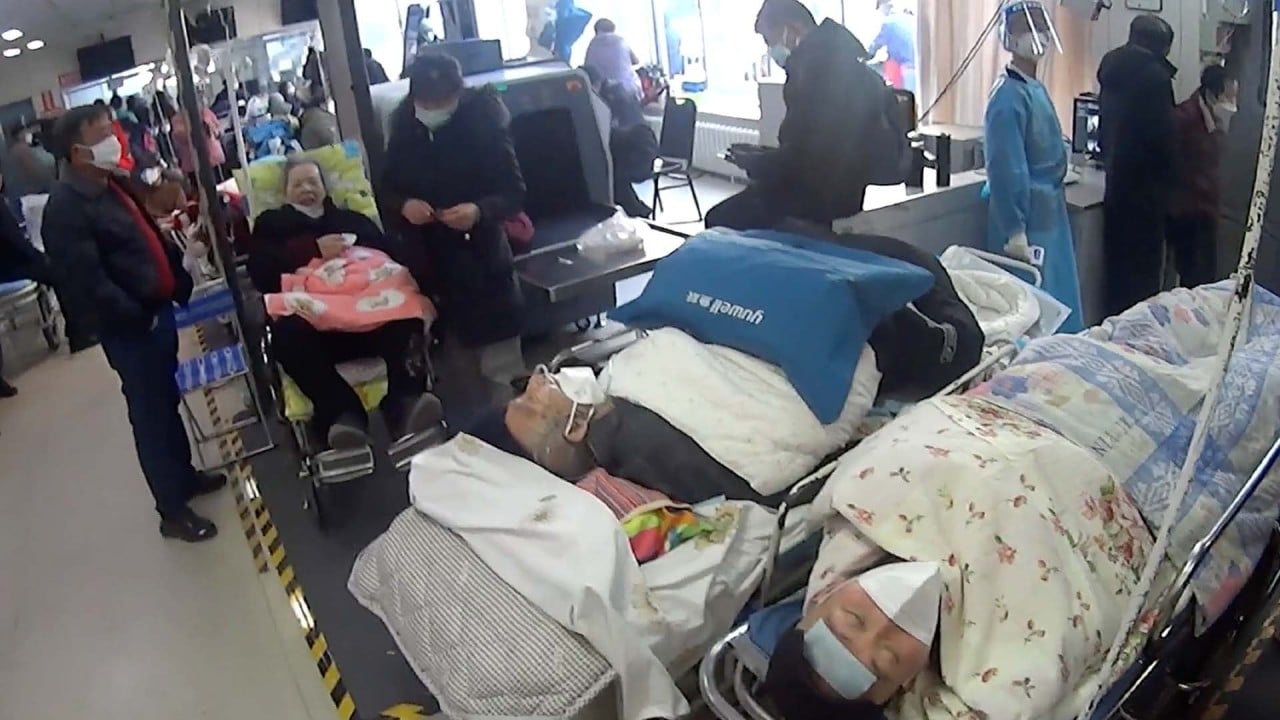
01:38
Hospital in China overwhelmed with patients after Covid controls eased

Earlier this week, Amy Luo, who lives in the southern Chinese city of Guangzhou, tested positive for Covid-19.
While she struggled with a fever, she managed to obtain hard-to-find medicines at a pharmacy, but as her symptoms began to change, she was not sure how often, or how much of the medicine to take.
“I didn’t go to a nearby hospital to see the doctor,” Luo said. “Too many people were there. I was afraid to get cross-infected.”
Instead, she turned to Ask Doctor, a mini-programme offered on the Baidu Health platform, which is operated by China’s biggest search engine.
As surging Covid infections strain China’s health system, hospitals and “medical solutions providers” offering internet consultations have been swamped with inquiries.
On December 12, in a bid to take some of the stress off of China’s overwhelmed medical system, health authorities under the State Council notified medical institutions they would be allowed to consult patients with Covid-related symptoms online, and to prescribe drugs.
These services are known as “internet hospitals” and are part of an emerging sector offering online consultation, diagnosis and treatment.
It was the first time that internet hospitals were allowed to prescribe drugs to patients without seeing them in person. Before the policy shift, these facilities could only take follow-up appointments – not first-time consultations.
Beijing and Shanghai have released a list of internet hospitals with fever clinics to take questions and prescribe drugs. In Guangzhou, health authorities have recommended that non-emergency patients seek online medical consultations.
“The internet medical platforms have played a very important supporting role after the [policy] relaxation, especially when hospitals are overwhelmed by patients,” said Zhang Yi, chief analyst at consulting firm iiMedia Research.
In November, as part of China’s 14th five-year plan, authorities announced that more than 1,700 internet hospitals had been established across China by June – up from just 197 in 2019. Seventy per cent of them are part of public medical institutions. More than 300 million people are now registered users, according to authorities.
After Luo logged onto Baidu Health’s mini-programme through WeChat and described her symptoms, her case was matched to a doctor from a hospital. As part of the free service, she was advised on how to take her medication, what to eat, and how to protect family members in the same household.
“But the doctor was quite cautious and would not recommend a specific kind of medicine,” Luo said.
Baidu Health said that its consulting doctors were from public hospitals and had been trained to diagnose and treat coronavirus cases.
Data from Baidu Health showed it recorded a 1,270 per cent increase in Covid-related inquiries on its platform in the first two weeks of December, and the numbers have continued to rise.
Meanwhile, the search volume related to Chinese medicine Lianhua Qingwen soared 1,283 per cent in the week from December 5 to December 12, while inquiries about the anti-inflammatory drug ibuprofen jumped 950 per cent.
Good Doctor Online, an internet hospital based in Beijing that has 250,000 registered medical professionals, said that since the State Council’s new policy took effect, average daily order volume on its platform had increased by 133 per cent, while the number of personalised consultations with specific doctors rose by 30 per cent.
“On the platform, patients can maintain long-term contact with their attending doctors. Many patients with underlying diseases will usually contact their attending doctors first after contracting Covid-19. The attending doctor can combine the patient’s medical history and consultation history to give efficient and accurate advice,” a spokeswoman said.
She said consultation times could vary depending on the case. One function allowed patients to be treated within three minutes, but sessions could last up to two hours.
A doctor in Guangdong province, who helps with online consultations and requested anonymity, said most patients he saw were in stable condition and for follow-up appointments.
Zhang from iiMedia Research, said most elderly patients were not familiar with telemedicine, and frequent users tended to be tech-savvy, better-educated people. But online consultations would likely become more in demand as Covid-19 outbreaks spread from urban to rural areas.
“I estimate that the peak of online medical consultations will arrive within the next month,” Zhang said.
“[The government] should formulate policies to help develop the industry, which would help to ease pressure on the public healthcare system.”
In a separate move, on Tuesday, tech giant Tencent launched a Covid-information-sharing mini-programme on WeChat, where people can post messages if they are looking for medicines, or share extra medicines with those in need.
As of Wednesday afternoon, the platform had more than 50,000 posts, with people in Shenzhen, Hangzhou, Shanghai, Guangzhou and Nanjing being the most in need, according to Tencent.